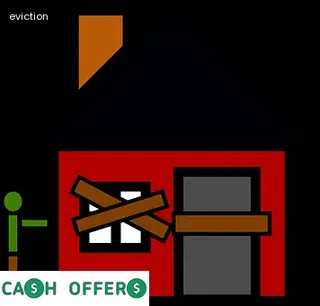In Michigan, the eviction process is a legal procedure that landlords must follow when they wish to remove a tenant from their property. The process begins with the landlord delivering a written notice to the tenant outlining why they are being evicted and when they must vacate the premises.
If the tenant does not comply with the notice, then the landlord can file an eviction action in court. The court will then review both sides of the case before making its decision.
If the court rules in favor of the landlord, it will issue an order for possession of the property and set a date for removal of any remaining tenants or personal belongings. After that date, if necessary, local law enforcement may be called upon to enforce the order and assist with removal of any remaining tenants or property.

When it comes to understanding the eviction process in Michigan, it is important to understand the underlying reasons for an eviction. The most common reason for eviction in Michigan is non-payment of rent.
This occurs when a tenant does not make their required rental payments on time and in full, as per their lease agreement. Other common reasons for evictions include property damage, violation of other terms of the lease agreement, or creating a nuisance or disturbance to other tenants or neighbors.
In addition, there are also legal and municipal regulations that must be met, such as keeping a property up to health and safety standards and adhering to local zoning laws. Regardless of the reason for the eviction, it is important to understand what steps need to be taken in order to legally remove a tenant from a property.
Serving a tenant with notice of eviction is a crucial step in the eviction process. The landlord must serve the tenant with an official notice of eviction, which can be done in one of two ways: personally or by posting on the property.
Personal service requires the landlord to give the tenant a copy of the notice, either by handing it directly to them or having someone else hand it to them. If personal service is not possible, then the landlord can post the notice on the property in a place where it can easily be seen and read.
In Michigan, landlords must also send copies of their notices via certified mail, return receipt requested so they can prove that they have served their tenants properly. It is important for landlords to understand that if they fail to follow proper procedure when serving their tenants with notices of eviction, courts may not uphold any evictions based on those notices.

When asking for possession of the property during an eviction process in Michigan, it's important to understand the legal steps necessary to protect your rights. Start by obtaining a copy of the eviction notice from the court.
This document will provide you with an explanation of why you are being evicted and what you need to do in order to regain possession of the property. You'll also need to prepare any documents or evidence that you have that can help support your case.
Once everything is ready, file a motion with the court requesting possession of the property and wait for a hearing date. If your motion is approved, you may be able to take back possession of the property without having to go through a trial.
Be sure to follow all court orders and comply with any local regulations as part of the eviction process in Michigan.
When trying to gain possession of a property in Michigan, there are some strategies that can help the process go smoother. First and foremost, it is important to understand the legal rights of a landlord when evicting a tenant.
This means knowing the eviction laws that apply in Michigan and what paperwork needs to be filled out and filed with the court. Additionally, landlords should investigate their options when it comes to alternative dispute resolution such as mediation or arbitration.
These methods may be more cost effective and quicker than going through the formal eviction process. It is also important for landlords to act quickly and follow all of the steps outlined in the eviction process in order to ensure they receive possession of their property as soon as possible.
Furthermore, landlords should make sure they have all necessary documents ready for submission when filing an eviction lawsuit including a notice to quit for tenants who have not paid rent or violated other terms of their lease. Ultimately, having knowledge of these strategies can help landlords secure possession of their property in Michigan more efficiently.

Exploring Michigan's Eviction Timeline can be a daunting task for those who don't understand the process. In Michigan, there are specific steps one must take in order to begin an eviction.
First, the landlord must give the tenant notice that they are in violation of their lease agreement and that they must remedy or vacate the premises. If the tenant does not respond or cure their violation within the allotted time period, a complaint must be filed with the court system.
After filing, a hearing date will be set where both parties have an opportunity to present evidence and make arguments for why or why not an eviction should occur. The judge then makes a decision based on the evidence presented at this hearing.
If the court finds in favor of eviction, then it is up to law enforcement officers to execute the order and remove any occupants from the property. Knowing these steps can help ensure that evictions in Michigan are done properly according to state laws and regulations, making The Ultimate Guide To Understanding The Eviction Process In Michigan an invaluable resource for landlords and tenants alike.
In Michigan, evicting a tenant can be a complex process that requires attention to detail. Fortunately, there are plenty of free resources available to help landlords through the process.
Michigan Legal Help provides an online resource guide with step-by-step instructions on how to start and complete the eviction process in the state. The guide covers topics such as the rules for evicting tenants, notice requirements, and what to do if the tenant refuses to leave.
Additionally, rental property owners can access free legal advice from local organizations such as the Michigan State Bar Association or Legal Aid of Western Michigan. These services may be able to provide assistance in filing paperwork, understanding tenant rights, and negotiating an agreement between landlord and tenant.
If a landlord needs further information about evicting a tenant in Michigan, they can consult The Ultimate Guide To Understanding The Eviction Process In Michigan for a comprehensive overview of the eviction process.

DoorLoop is a revolutionary platform that streamlines the eviction process in Michigan. It provides valuable resources to landlords and tenants, helping them understand their rights and obligations under state laws.
DoorLoop simplifies the entire process, from filing for an eviction notice to scheduling court hearings and enforcing the order. DoorLoop also keeps both parties informed about all legal steps involved in the eviction process, providing timely updates to ensure that everything is handled correctly.
With DoorLoop's user-friendly interface, it's easy to navigate through the complex rules and regulations of the Michigan Eviction Process. This ultimate guide helps landlords and tenants avoid costly mistakes while ensuring they comply with all local, state, and federal statutes.
By utilizing DoorLoop's automated system, landlords can save time and money while efficiently evicting tenants who are in violation of their lease agreement.
DoorLoop provides a comprehensive demo of its eviction process software, which can help landlords in Michigan save time and make money. This demo offers a detailed overview of the entire eviction process, from filing an eviction notice to initiating legal action if necessary.
The ultimate guide to understanding the eviction process in Michigan walks individuals through each step, from obtaining a court order to recovering rent payments. DoorLoop's software simplifies this process, allowing landlords to quickly create personalized notices and stay up-to-date on the status of their cases.
It also streamlines communication between tenants and landlords throughout the duration of the case. Requesting a demo from DoorLoop is the perfect way for landlords in Michigan to get acquainted with all that this software has to offer, so they can maximize their efficiency and increase their profits.

Putting your portfolio on DoorLoop can be a great way to protect yourself during the eviction process in Michigan. Having everything in one place allows you to provide all the necessary documents quickly and easily, which can help speed up the process.
Additionally, DoorLoop's secure system ensures that your personal information is encrypted and stored safely. You'll also have access to all of your documents anytime you need them, so you won't have to worry about running out of time or missing anything important.
This makes it easier for landlords and tenants alike to keep track of the status of their paperwork and stay informed every step of the way. Lastly, DoorLoop offers excellent customer service with an easily accessible support team to answer any questions or concerns you may have.
Ultimately, taking advantage of DoorLoop's services can make navigating Michigan's eviction process much easier and less stressful for both parties involved.
Understanding when to issue a demand for possession in Michigan is an important part of understanding the eviction process. In order to legally evict a tenant, landlords must provide proper notice and follow the correct procedures.
The first step in the eviction process is generally issuing a demand for possession, which requires providing written notice to the tenant that they must leave the property by a certain date. This notice should include information about why the eviction is taking place, how much time the tenant has to vacate, and any other relevant information.
Additionally, it is important to understand when an eviction can be legally carried out in Michigan. Generally speaking, an eviction cannot take place until at least seven days after a demand for possession is issued; however, this timeline may vary depending on specific circumstances.
Additionally, if the tenant does not vacate within this time period, landlords can file an eviction complaint with their local court. It's also important to note that some types of tenants have additional protections under Michigan law and may be able to stay longer than seven days before being evicted.
Understanding these laws and regulations is essential for successful navigations of the eviction process in Michigan.
Evicting a tenant from a residential property in Michigan is typically a long and complex process. According to the Michigan Department of Licensing and Regulatory Affairs, the eviction process can take anywhere from 7-30 days depending on a variety of factors such as filing fees, court procedures, notice requirements, and more.
If a landlord is able to secure a court order for eviction, the tenant will have 7 days to vacate before the sheriff is sent out with an eviction notice. In some cases, however, it may take longer due to delays in court proceedings or other legal matters.
It’s important to note that if the tenant appeals their eviction case or doesn’t comply with the court order within 7 days, it can add extra time to the process. To ensure that you understand all aspects of evicting a tenant in Michigan, be sure to review The Ultimate Guide To Understanding The Eviction Process In Michigan for detailed steps on how to complete this process quickly and efficiently.

In Michigan, evicted tenants must move out of their rental property within 7 days of being served with the eviction notice. The landlord may give an additional seven-day grace period to allow for necessary arrangements to be made.
However, if the tenant is unable or unwilling to move out within this timeframe, a landlord can take further legal action in order to remove them from the property and reclaim possession. It is important for tenants to understand the entire eviction process in Michigan, including how long they have to move out after being served with an eviction notice.
In this ultimate guide, we will provide you with all the information needed to understand the process and your rights as a tenant in Michigan.
In Michigan, the eviction process typically begins with a landlord serving the tenant with an eviction notice. The tenant then has 30 days to either comply with the notice or file a motion to contest it.
If the tenant fails to do either, they may be forcibly evicted by a court order. It is important to understand that while tenants have 30 days after receiving an eviction notice in Michigan, this does not necessarily mean that they can stay in the property for 30 days without consequence.
The landlord may still take legal action against them during this period and should be aware of their rights and responsibilities throughout the process. The Ultimate Guide To Understanding The Eviction Process In Michigan is designed to help landlords and tenants better understand their rights and obligations when facing an eviction situation in Michigan so that both parties can make informed decisions moving forward.
After an order of eviction is issued in Michigan, the tenant has seven days to leave the property. If they do not vacate within the designated timeframe, their landlord can seek assistance from a local sheriff or constable to physically remove them from the premises.
The eviction process must be handled by a professional with the proper training and certification; otherwise, it is considered illegal. Once all of the tenant’s belongings have been removed from the property, the landlord is responsible for securing it until it can be rented again.
The state of Michigan requires landlords to store any abandoned items for at least 30 days before disposing of them. It is up to landlords to keep detailed records of these possessions and provide written notice if they plan on discarding any items.
Evicted tenants may also be liable for court costs and other associated fees as determined by their county court judge. Understanding the eviction process and all its intricacies can help avoid both legal and financial headaches down the line.